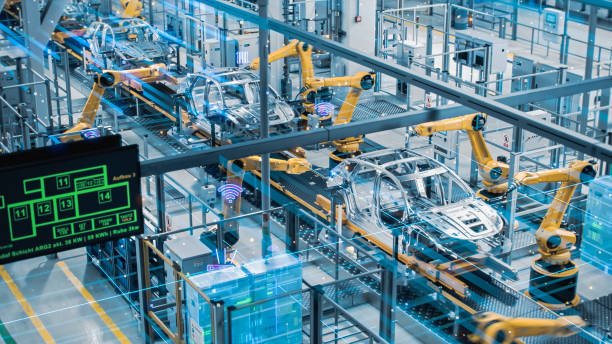Modular Manufacturing: Reshaping Industrial Production
The concept of modular manufacturing is gaining traction as a game-changing approach to industrial production. This innovative methodology, which breaks down complex manufacturing processes into standardized, interchangeable units, is revolutionizing how companies design, produce, and scale their operations. By embracing modularity, businesses are discovering new avenues for flexibility, efficiency, and customization that were previously unattainable in traditional manufacturing settings.

The Foundations of Modular Manufacturing
Modular manufacturing is rooted in the principle of breaking down complex systems into smaller, standardized components that can be easily assembled, disassembled, and reconfigured. This concept draws inspiration from diverse fields, including computer science, architecture, and product design. In the manufacturing context, modularity enables the creation of flexible production lines that can be quickly adapted to produce different products or accommodate varying production volumes.
The key to modular manufacturing lies in its standardized interfaces and components. These elements allow for seamless integration and interchangeability between modules, facilitating rapid reconfiguration of production processes. This standardization also promotes economies of scale, as modules can be mass-produced and utilized across multiple product lines or even different industries.
Advantages of Modular Manufacturing Systems
Modular manufacturing offers numerous benefits that address many of the challenges faced by traditional manufacturing approaches. One of the primary advantages is the increased flexibility in production. Companies can quickly adjust their manufacturing processes to meet changing market demands or introduce new products without significant retooling or downtime.
Another significant benefit is the potential for cost reduction. By utilizing standardized modules, businesses can minimize custom engineering and reduce the complexity of their production systems. This standardization also leads to easier maintenance and troubleshooting, as faulty modules can be quickly identified and replaced without disrupting the entire production line.
Modular manufacturing also enhances scalability. Companies can start with a small production setup and gradually expand by adding modules as demand increases. This scalability is particularly beneficial for startups and small to medium-sized enterprises that may not have the resources for large-scale traditional manufacturing facilities.
Implementing Modular Manufacturing: Challenges and Strategies
While the benefits of modular manufacturing are compelling, implementing this approach comes with its own set of challenges. One of the primary hurdles is the initial investment required to transition from traditional manufacturing methods to a modular system. This transition often involves redesigning products, reconfiguring production lines, and retraining staff.
To overcome these challenges, companies need to adopt a strategic approach to implementation. This starts with a thorough assessment of current production processes and identifying areas where modularity can offer the greatest benefits. It’s crucial to involve cross-functional teams in this process, including engineering, production, and management, to ensure a comprehensive understanding of the implications and potential of modular manufacturing.
Another key strategy is to start small and scale gradually. Companies can begin by implementing modular principles in a specific product line or production area before expanding to the entire operation. This phased approach allows for learning and adjustment while minimizing disruption to ongoing operations.
Industry Applications and Case Studies
Modular manufacturing is finding applications across various industries, from automotive to electronics and consumer goods. In the automotive sector, for instance, companies are using modular platforms to produce multiple vehicle models on the same production line, significantly reducing development time and costs.
A notable example is Volkswagen’s Modular Transverse Toolkit (MQB) platform, which allows the company to produce a wide range of vehicles, from small cars to SUVs, using the same basic components. This approach has enabled Volkswagen to reduce production costs while increasing its ability to customize vehicles for different markets.
In the electronics industry, modular manufacturing has enabled companies to quickly adapt to rapidly changing consumer preferences. Phonebloks, a conceptual smartphone design, demonstrates how modularity can extend to the product level, allowing consumers to upgrade specific components of their devices rather than replacing entire units.
Future Trends and Innovations in Modular Manufacturing
As technology continues to advance, the potential of modular manufacturing is set to expand further. The integration of Industry 4.0 technologies, such as the Internet of Things (IoT) and artificial intelligence, is enhancing the capabilities of modular systems. Smart modules equipped with sensors and connectivity can provide real-time data on performance and maintenance needs, enabling predictive maintenance and further optimizing production processes.
Another emerging trend is the concept of “micro-factories” – small, modular production units that can be deployed closer to end markets. This approach aligns with the growing demand for localized production and can significantly reduce transportation costs and time-to-market for products.
Key Insights for Implementing Modular Manufacturing
• Conduct a thorough analysis of your current production processes to identify areas suitable for modularization.
• Invest in standardized interfaces and components to ensure seamless integration between modules.
• Train your workforce on the principles and operation of modular systems to ensure smooth adoption.
• Start with a pilot project in a specific product line or production area before scaling to the entire operation.
• Collaborate with suppliers and partners to develop a modular ecosystem that can support your manufacturing needs.
• Regularly assess and update your modular strategy to align with technological advancements and market demands.
In conclusion, modular manufacturing represents a significant leap forward in industrial production methodologies. By offering unprecedented flexibility, efficiency, and scalability, it empowers businesses to meet the challenges of modern manufacturing while staying agile in an ever-changing market landscape. As industries continue to evolve, embracing modular principles will likely become not just an advantage but a necessity for companies aiming to maintain their competitive edge in the global marketplace.






